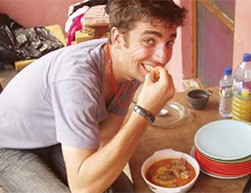
Students spend approximately 25 percent of their MSW graduate education participating in a field placement. They have reported that some of their most memorable and rewarding experiences have been generated from their field-based experiences. Many of our students come to the School of Social Work from numerous places around the country and the world, and they are eager to learn how to make a difference. The Office of Field Instruction is enthusiastic about working in tandem with students to develop and approve a variety of field experiences that match their interests and needs. The following students have taken a leadership role in identifying fieldbased opportunities.
Antoinette Saenz
Community organizing in social services Orange County, California
“I worked with Families and Communities Together (FaCT), a unique partnership between the Social Services Agency and Orangewood Children’s Foundation to prevent child abuse. During my internship, I felt immersed in a community and had a hands-on experience with all aspects. I worked on various projects with community members of Orange County and Child Protective Services workers, including organizing and attending trainings in community development, youth development, and domestic violence. My greatest enjoyment was putting together an ‘appreciation tea,’ in which eleven family resource centers were honored with a proclamation from the Orange County Board of Supervisors for their continuous service.”
Emily Carey
Human rights organizing El Paso, Texas
“Working for Border Network for Human Rights in El Paso, Texas, afforded me the opportunity to work in community-based policy, media, and legal advocacy from the local to the international levels at a time when anti-immigrant public and political rhetoric created a border war zone. In conjunction with community members, I coordinated a campaign to end local law enforcement of federal immigration law and organized an authentic community border hearing attended by local, regional, and national elected officials. I witnessed the courage of collective action as immigrant communities struggled against daily indignities and for immigration reform and border enforcement policy that take into account the human dignity of all people.”
Ben Hayes
Public health Accra, Ghana
“I feel extremely fortunate to have spent the summer in Ghana learning from communitybased HIV/AIDS organizations (CBOs). I worked with The AIDS Support Association (TASA), an association of people living with HIV/AIDS in the port city of Tema, and the Center for Popular Education and Human Rights (CEPEHRG), an LGBT group in Accra. Exploring the challenges of community-based organizing in international income-poor settings, I learned two primary lessons: 1) Ghana CBOs could greatly benefit from long-term technical and administrative partnerships and 2) outsiders must critically analyze the impact of their positioning in the local social, economic, cultural, and political contexts.”
Note: Ben Hayes, MSW/MPH student, did his field placement in Ghana through the University of Michigan/University of Ghana Social Work Professional Practicum Exchange Program, established in 1995 by Professor Edith Lewis and Professor Nana Apt, then department head at the University of Ghana. Ben’s trip was made possible by funding from the School of Social Work, the International Institute, and the Center for African and AfricanAmerican Studies.
Shenaaz Janmohamed
Community organization: Communities and social systems Garthama, Pakistan-administered Kashmir
“The South Asia earthquake of 2005 devastated much of Northern Pakistan and parts of Kashmir and India, killing over 73,000 souls and displacing millions of smiles. The School of Social Work granted me the opportunity to visit Pakistan and provide disaster relief. During this time, I witnessed endless suffering yet an admirable and necessary resilience within the people. I wanted to capture this strength and saw gaps in participatory-inspired programs as a vehicle to empower communities. The photovoice methodology provided a platform for child survivors to share their knowledge and courage to inspire others. The project asked for children’s input on infrastructural damage and the effects the earthquake had on their lives.”
Note: Though not a field placement, Shenaaz’s summer experience was funded by a U-M International Institute Individual Fellowship and was hosted by the Aga Khan Development Network.
—Betsy Voshel, LMSW, ACSW, is director of Field Instruction and assistant clinical professor of social work.